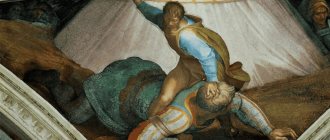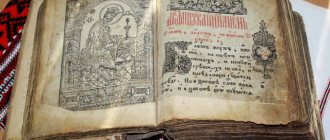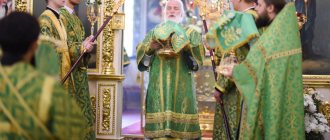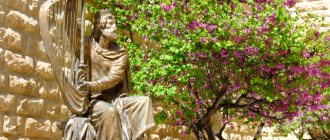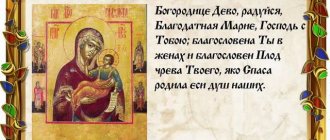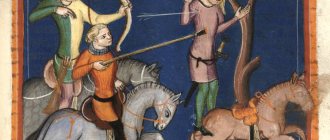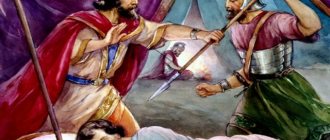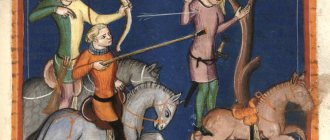Psalm 17
1 Finally, to the servant of the Lord David, even the words of the Lord spoke this song, on the day that the Lord delivered him from the hand of all his enemies, and from the hand of Sauli, and said
2 I will love you, O Lord, my strength.
3 The Lord is my strength, and my refuge, and my Deliverer, my God, my Helper, and I trust in Him, my Defender, and the horn of my salvation, and my Advocate.
4 With praise I will call on the Lord and I will be saved from my enemies.
5 Mortal diseases have overcome me, and the floods of iniquity have crushed me,
6 The diseases of hell have come upon me, having preceded me to the snares of death.
7 And when I was in sorrow, I called on the Lord and cried to my God, hearing my voice from the temple of His Holy One, and my cry before Him would come into His ears.
8 And the earth moved and trembled, and the foundations of the mountains were shaken and moved, because God was angry with it.
9 The smoke of His wrath ascends, and the fire from His presence is kindled; coals are kindled from Him.
10 And bow the heavens, and those below, and the darkness under His feet.
11 And we mounted the Cherubim, and flew, flew on the wing of the wind.
12 And He put His darkness around His village, the dark waters in the clouds of the air.
13 From the shedding of clouds before Him came clouds, hail, and coals of fire.
14 And the Lord and the Most High will roar from Heaven and give His voice.
15 She sent down arrows and dispersed me, and multiplied lightnings and overwhelmed me.
16 And the springs of water were revealed, and the foundations of the world were revealed, because of Thy rebuke, O Lord, because of the inspiration of the spirit of Thy wrath.
17 She sent down from on high, and received me; they took me from many waters.
18 He will deliver me from my mighty enemies and from those who hate me, for she has become stronger than me.
19 Foretold me in the day of my bitterness, and the Lord was my confirmation.
20 And he will bring me out into the wideness; he will deliver me, as he willed me.
21 And the Lord will reward me according to my righteousness, and according to the purity of my hand he will reward me.
22 For I have kept the ways of the Lord and have not committed wickedness from my God.
23 For all His destiny is before me, and His righteousness does not depart from me.
24 And I will be blameless with Him, and I will be kept from my iniquity.
25 And the Lord will reward me according to my righteousness and according to the purity of my hand before His eyes.
26 You will be like a venerable man, and you will be innocent with an innocent man,
27 And you will be chosen with the chosen, and with the obstinate you will be corrupted.
28 For You have saved the humble people and humbled the eyes of the proud.
29 For You have enlightened my lamp, O Lord my God, enlighten my darkness.
30 For through You I will be delivered from temptation, and through My God I will go over the wall.
31 My God, His way is blameless, the words of the Lord are kindled, He is the Protector of all those who trust in Him.
32 For who is God except the Lord? or who is God except our God?
33 God girdle me with strength, and make my way blameless.
34 Make my noses like trees, and place me on high.
35 Thou hast taught my hands to fight, and thou hast placed the bow of my arm in copper.
36 And You have given me the protection of salvation, and Your right hand will receive me, and Your punishment will correct me in the end, and Your punishment will teach me.
37 Thou hast enlarged my feet under me, and my feet are not faint.
38 My enemies will marry, and I will suffer, and will not return until they die.
39 I will offend them, and they will not be able to stand; they will fall under my feet.
40 And thou hast girded me with strength for battle; thou hast slept all that rise up against me under me.
41 And you gave me a backbone to my enemies, and you consumed those who hated me.
42 You cried, and did not save: to the Lord, and did not hear them.
43 And I will crumble like dust before the wind, like the clay of the paths I will wipe out.
44 Deliver me from the bickering of people, place me at the head of the nations. People who don’t know who work with us.
45 Listen to me by the ear of your ear. The sons of strangers lied to me.
46 The sons of strangers have vowed and are lame from their paths.
47 As the Lord lives, and blessed is God, and may the God of my salvation be exalted.
48 God grant me vengeance and subdue the people under me.
49 My deliverer from my wrathful enemies, lift me up from those who rise up against me, deliver me from the unrighteous man.
50 For this reason let us confess to You publicly, O Lord, and to Your name I will sing:
51 Greater the salvation of the king, and show mercy to your Christ David, and to his seed forever.
History of writing
As for the time of writing Psalm 15, indications of it can be found in the content itself. In verse 2, God does not require “good things” from David. This expression should be understood as sacrifices, which are an obligatory and most important component of the Old Testament cult. When the Lord did not demand sacrifices from David, we see an indication in the third verse of the psalm. By “saints” here we mean the Jews, as a people chosen by God himself, called to great service and receiving great promises from him.
In Psalm 15, David separates himself from the Jews who lived on “His” land, that is, the Lord assigned to him, Palestine. This means that at the time described, David is outside the Jews and is outside Palestine. The fourth verse depicts the wickedness of those around him, in which he himself takes no part. Thus, David is away from his people, unable to offer sacrifices to God, and surrounded by pagans. This state of affairs corresponds to the period of David’s life under Saul, when he was forced to flee from his persecution to Ziklag, to the Philistine king Ahnus. Evidence of this is described in the first book of Kings (27:1-7).
History of writing
Psalm 27 was written at the same time as a number of others included in the Psalter collection. Experts who study the works of King David have no doubt about this. The song of praise became for the prophet a cry of the soul addressed to the Lord, and it remains such to this day for modern Christians.
The theme of the 27th Psalm is similar to the theme of the 26th, some suggest that this work continues it. This possibility cannot be excluded, because this text was composed by God’s anointed during the time of his persecution, the uprising organized by Absalom. Fleeing from his son and his entourage, David hoped to ensure his safety in his wanderings. All this time he hoped in the Almighty, his mercy, prayed for a fair trial for apostates, for punishment for enemies. An important emphasis in the work is placed on the theme of saving the soul of the righteous.
Interpretation
In Psalm 33, the author says that the Lord will save those who trust in him and praise him. For a more detailed interpretation, you should consider the verses separately:
- Verses 1-3 - the psalmist expresses the idea that moral people who glorify the Lord stand closer to him than others. At the same time, their praise must be sincere and come from the heart in response to any God's mercies.
- Verses 4-5 – The author explains the need to praise the Lord. After all, all the deeds he does are fair and righteous, you can always rely on his words.
- Verses 6-11 - they develop the idea expressed in the previous verses. The psalmist emphasizes that the intentions, plans and goals of the Lord cannot be undermined by anyone, and everything he has planned will be carried out from generation to generation.
- Verses 12-19 - in these lines praise is exalted to God, who not only created people, but also delves into their deeds and intentions. The author expresses his joy at being part of God's chosen people. He emphasizes that the Lord never comes to the aid of the proud and arrogant, and therefore neither powerful armies nor numerous cavalry will save them. Only to those who trust in him will he come to the aid in times of distress and need.
- Verses 20-22 – In the last verses of Psalm 32, the psalmist assures the Lord that the Jewish people trust in him, hope for his mercies, and praise him.
The main idea of Psalm 32 is that the Lord loves those who fear and honor him. It is to them that he will provide patronage and protection in difficult situations, feed them during hunger and “save their souls from death.”
The meaning of Psalm 27
Verses 1 to 3: The king asks God to answer his repentance and prayer. He hopes that the Almighty will not remain silent and turn a blind eye to the evil deeds of the lawless. He does not believe that the Lord will reject the requests of the innocent, so he does not stop crying out to heaven. David admits that he is not sinless; in his life he has made many mistakes, which he sincerely regrets, counting on the mercy of the One Creator.
Verses 4 and 5: In this part of the work, vice describes his feelings towards the traitors, because of whom he is forced to flee. He believes that God will grant protection to him and his family. He does not wish death on his enemies, but wants them to be judged fairly.
Verses 6 to 8: The author expresses hope for salvation through faith in the Lord, because he is salvation itself.
Interpretation of Psalm 48
The psalm illuminates the essence of the Creator's providence about the future of people who are rich and arrogant, blessed and righteous. The theme of Psalm 48 is not only relevant at the time of creation and today, but will remain so until the end of time. For there is no person who would not wonder why the rich and wicked prosper and know no sin, while the righteous eke out a miserable existence. King David announces the wisdom of the Lord and rewarding everyone according to his deeds.
- Verses 1-5: the author calls on everyone living on earth to listen to the wisdom of God revealed to him, rich and poor, simple and noble. David warns that his words may seem like a riddle, but those who listen carefully will understand the meaning of the psalm.
- Verse 6: The author says that there is no need to fear death, even if enemies surround you on all sides. Later in the story, David will explain why.
- Verses 7-10: No one escapes death. Neither rich nor powerful. It is impossible to buy your way out of death, and there is not a single person who lives forever.
- Verses 11-12: No one can escape death, but the rich consider themselves wise and hope to live in eternity, calling cities and countries by their proper names. There is nothing in these acts other than painful self-delusion.
- Verses 13-14: Those who desire glory do not receive honor during their lifetime, although they have supporters who approve of their deeds. But after death they will sink into oblivion, like silent animals.
- Verses 15-16: After death, the souls of the wicked will go to Sheol and remain there forever. Whereas the righteous in the future life (“the next morning”) will find themselves in paradise and will be delivered from eternal torment.
- Verses 17-18: We should not envy people who become rich, because when they die they cannot take with them anything they have accumulated, neither money nor fame.
- Verse 19: While the wicked is alive, those around him flatter him and sing his praises. Worldly glory passes after earthly life. Not a single praise that you received during your lifetime will save you or lead you out of eternal darkness.
Interpretation
The meaning of Psalm 47 is revealed to those who carefully study the interpretation of individual verses of the work:
- Verse 1: The song begins by identifying its performers, the children of Korah. The author describes the sorrows that he had to face due to the machinations of the enemy. He talks about the betrayals of loved ones who turned against him. In such conditions, he nevertheless does not deviate from his chosen faith, although the majority does not want to recognize it. People turned away from the Lord, which means they stopped believing that their ruler was chosen by Him to reign. But even then the ruler trusted in God and sought His protection.
- Verses 2 to 8: Jerusalem is described in detail, its splendor, admiring it, one cannot help but glorify the Lord, since this city was chosen by Him. Jerusalem here is called the place of God's grace, His glory. It is also referred to as “sacred,” “intended for the service of the Almighty.” This city is protected by the One Creator, which is known to everyone. In a life full of sin, he will always be a stronghold of faith, purity and justice.
- Verses 9 to 15: The emphasis is on instruction to the people of Israel, on teaching from God. You must rely on it for your own good in any situation, especially in moments of battle with the enemy, in times of his defeat, which is a manifestation of the Lord’s mercy. Here the author returns to rejoicing at the power of the Almighty, to the realization that His power will be established forever. The psalmist emphasizes that relying on God’s protection is not enough; one must be confident in his goodness, which extends to all nations. At the end of the work it is stated that the One Creator will accept anyone who recognizes him as their salvation, and such will be granted His protection.
We advise you to study Congratulations on St. Nicholas Day in verse
Elders and Elders ABOUT READING THE 17th KATHISMA. THE 17TH KATHISMA WILL PROTECT YOU AT THE TORMENTALS.
Read the 17th kathisma - pray away your sins and the sins of your relatives to the 7th generation. Be sure to read the 17th Kathisma on Friday evening. Read the 17th kathisma for the deceased every day. Pray for the Kingdom of Heaven.
Reading morning prayers is a blessing for the day. Vespers - forgiveness of sins.
There are three main books: the Gospel, the Epistle of the Apostles and the Psalter - they can be compared with the originals. Nothing can be fixed about them. All the other books are fake now: I changed one or two words and the meaning of the prayer changed. They undergo computer processing and the meaning changes. Use only old books.
O. Ioannikiy (Chikhachevo)
Elder schema-nun Antonia: “The seventeenth kathisma is the basis of the Psalter, it must be read in its entirety, it is indivisible... Remember the seventeenth kathisma! So that the seventeenth kathisma be read every day! You won’t be able to read it in the evening, which means during the day, on the road, anywhere, but the seventeenth kathisma must be read daily. This is your spiritual savings book, this is your capital for your sins. At the ordeals, the seventeenth kathisma will already be in defense for you.” Some people think that the 17th kathisma is read only when it is her turn and there is no other way. This is not entirely true. It is good to read it every day and many pious lay people do so. —- This is a great help for the deceased! We may not always feel it, that our prayer is getting through, but the deceased feel it and they really need support!!! They are waiting for our prayers and hoping for our help. And I really don’t want to deceive their hopes... On the third, ninth, fortieth days one should read the 17th kathisma according to the deceased. This kathisma depicts the bliss of those who walked in the law of the Lord, i.e. the bliss of righteous people who tried to live according to the commandments of God. The meaning and meaning of Psalm 119 are revealed in verse 19: “I am a stranger (stranger) on earth: do not hide Your commandments from me.” Explanatory Bible ed. A.P. Lopukhina gives this verse the following explanation: “Life on earth is a wandering, a journey made by a person to reach his fatherland and permanent, eternal residence. Obviously, the latter is not on earth, but beyond the grave. If so, then earthly life must be prepared for the afterlife, and only the unmistakably chosen path on earth can lead to it. How and where to find the last one? This path is indicated in the commandments of the Law. Whoever does not follow them is mistaken and will not reach the afterlife, i.e. afterlife, as a reward for the labor incurred to achieve it. Here is a fairly clear teaching about the purpose of earthly existence, the immortality of the human soul and reward after death.”
Elder Schema-nun Antonia advised reading the 17th kathisma every day and added that this would provide protection during the ordeals. Reading this kathisma is useful for the reader himself. After all, the purpose of our life is to keep the commandments, to avoid sin. In 17 Kathisma there are a lot of such invocations. Having read this kathisma at least once, it is difficult not to be moved. Be sure to read this kathisma for the deceased if you know how to read the Psalter. This is almsgiving with a very generous hand. You will feel great comfort. There will be obstacles and lack of time, but try to find time for such a good deed. You won't be disappointed. Remembrance of the dead is also important for the salvation of our souls.
Whoever reads the Psalter at night with two kathismas goes for the entire Psalter. It is more valuable to read the Psalter out loud, silently if necessary. Raise the nightly Psalter - pray for yourself and those you don’t know to the seventh generation. Daytime is also valuable. Just as leaves fall from a tree in autumn, so do sins from a person reading the Psalter.
# Schema-Archimandrite Ioannikios
— The Psalter drives away evil spirits. St. Barsanuphius of Optina said that every Orthodox Christian needs to read at least the Glory a day. I want to say that St. Alexander, the head of the monastery of the Never-Sleeping, introduced the Rite of the Never-Sleeping Psalter in the monasteries. It is very well written about him in the Cheti-Minea. Some spiritual giants read the entire Psalter a day on an ongoing basis. Like, for example, Simeon the Divnogorets, Parthenius of Kiev, and others. Ephraim the Syrian speaks of the psalms, so that they are constantly on our lips. This is such a sweetness - sweeter than honey and honeycombs. The law of the Lord is good to us more than thousands of gold and silver. I have loved Your commandments more than gold and topaz (Psalm 119, 127). Indeed, you read it and cannot be moved. This is wonderful! Not everything is clear when reading. But Ambrose Optinsky says that understanding comes with time. Open my eyes, and I will understand the wonders of Your law (Psalm 119:18). Let us really hope that our spiritual eyes will be opened.
QUESTION: I read several psalms today. It’s happening slowly, because at the same time I’m reading St. John Chrysostom’s Discourses on the Psalms. What do you say regarding kathisma 17 (Psalm 118)? I have a book of St. Theophan the Recluse “Guide to Spiritual Life”, compiled according to the interpretation of Psalm 118. A very interesting read, “is a guide to the Christian life.” Which Psalm is closest to your spirit?
ANSWER: The Gospel and the Psalter are the 2 main books. It’s not for nothing that many people knew them by heart. It is imperative to read the Psalter every day as well. And do not neglect the psalms. Abba Ammun: “Do not neglect the psalms, because they drive away evil spirits from the soul and infuse the Holy Spirit into it.”
It is advisable to read Psalm 118 every day. Not everyone can follow this rule, but the benefits will exceed all expectations.
The main thing for us is to try to fulfill the commandments. And in this psalm there are a lot of such petitions. Since “words”, “justifications” and other words can be generalized, synonyms for the word “commandments”.
Kathisma 17 (Psalm 118) teaches us to keep the commandments.
And this is so important: Blessed are those who keep His commandments, so that they may have the right to the tree of life and enter into the city through the gates (Rev. 22:14).
If we try to keep the commandments, we thereby show our love for God. Is it so important! If you love Me, keep My commandments (John 14:15).
If it’s hard to read every day, then you need to at least every Saturday, I think. This is a day of special remembrance. It’s not only good to read the interpretation, but it’s necessary. This opens our eyes. I love all the psalms. But Blessed Augustine made the following comparison: Speaking about the 17th kathisma (Psalm 118), Blessed Augustine testifies that for a long time he could not take up the interpretation of this psalm, being struck by its depth. He said that other psalms contain moral lessons; but those are like stars scattered across the sky; and this one is like the sun, shedding abundant light at noon.
“The seventeenth kathisma is the basis of the Psalter, it must be read in its entirety, it is indivisible... Remember the seventeenth kathisma! So that the seventeenth kathisma be read every day! You won’t be able to read it in the evening, which means during the day, on the road, anywhere, but the seventeenth kathisma must be read daily. This is your spiritual savings book, this is your capital for your sins. At the ordeals, the seventeenth kathisma will already be in defense for you.” Some people think that the 17th kathisma is read only when it is her turn and there is no other way. This is not entirely true. It is good to read it every day and many pious lay people do so. —- This is a great help for the deceased! Elder schemanun Antonia
Holy Fathers on reading the Psalter
— — — — —
